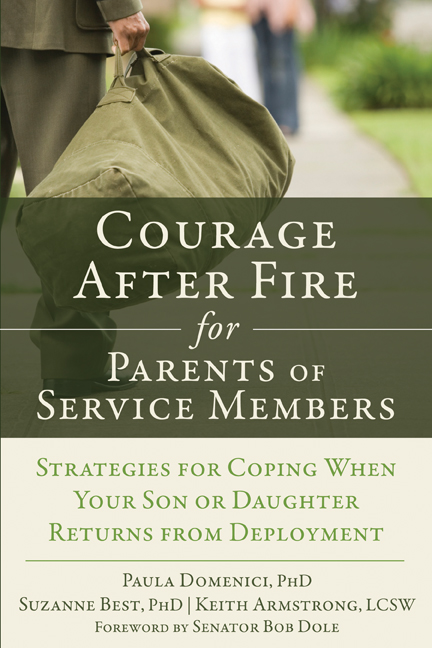Suzanne Best asks: Who takes care of the parents of veterans?
Open gallery

A critical part of the support network for veterans returning from war are parents. Parents step in to help with the financial, psychological, family and logistical challenges faced by sons and daughters returning from battle and trying to reintegrate into civilian life. This care takes a toll that is largely overlooked or minimized. Yet for parents who have maintained a singular focus on the safe return of their beloved child, the aftermath of deployment can be an overwhelming emotional roller coaster ride.
Suzanne Best, an adjunct professor of counseling psychology at Lewis & Clark, is trying to change this dynamic. She recently co-authored a new book for parents of veterans, Courage After Fire for Parents: Strategies for Coping When Your Son or Daughter Returns from Deployment and is currently conducting research on the experiences of parents of veterans. In her work as a clinical psychologist in Portland, Best specializes in treatment and forensic evaluation of trauma and stress disorders. We spoke to her about her work.
The book speaks directly to the parents of returning veterans. What unique challenges do parents of returning veterans face?
Suzanne Best: 2.6 million troops have served in Iraq and Afghanistan. This means there are approximately 5 million parents, plus step-parents, parents-in-law, mentors, and others who have been impacted by deployment since 2001. Given the large number of young service members who deployed to Iraq and/or Afghanistan (over 40% are under the age of 25), many have returned to live with or near their parents. And even if they don’t live with them, their mothers and fathers are usually still a big part of their lives. Yet what we have found is that these parents often feel unprepared to help their military child readjust after deployment or to find help if they have combat stress injuries like traumatic brain injury, post-traumatic stress disorder, or depression. We know it is common for them to feel at a loss about what to do, about how to communicate with their service member, and about how to show they care without feeling intrusive or interfering.
What services are currently available to parents of veterans?
Almost none. Parents of service members are not considered “dependents” in the military system so are not usually provided information or support that is typically given by the Department of Defence to the service member’s dependent family. Also, in the Veteran’s Administration, parents are not usually offered services unless the veteran brings them in for family therapy (something that’s not available at every facility). In addition, the health care system typically doesn’t involve parents in the assessment or treatment of their service member except when their son or daughter has been seriously wounded. With so many returning service members turning to their parents for guidance, these mothers and fathers are in turn left to their own devices to find answers and support.
The book focuses equally on what parents can do to help their sons and daughters returning from war, as well as what they can do to take care of themselves. Why is this important?
Caring for a psychologically and/or physically injured veteran can take a significant toll on the health and well-being of mothers and fathers. Yet prior to Courage After Fire, there were very few books or resources written just for parents and none written by mental health providers. We consider these parents unsung heroes and believe that they deserve both acknowledgement and support, which is why we wrote this book.
Parents often neglect their own needs because they believe that the needs of their child are more important. What we want parents to understand is that by caring for themselves, they will be better able to care for their son or daughter. To this end, we provide strategies and resources for both veterans and parents, many of which can be practiced together as a way of supporting each other.
What are some of the strategies parents can use to help their sons and daughters transition back to civilian life?
It’s not uncommon for service members to return with a “battlemind” mentality even though they are safe at home in the U.S. They may be constantly on guard, wary in crowds, want to carry a weapon all the time, drive aggressively as if to avoid the “enemy,” sleep “with one eye open,” and be used to following or giving orders. We encourage parents to recognize that it’s not easy for them to just turn off the skills that were their survival mechanisms while deployed. Rather than criticizing these reactions, parents can work to reassure a son or daughter that s/he is safe, secure, and no longer at war.
Have you heard from parents who have read the book? What do they say about how it helped them?
What we have heard from parents is that they appreciate that their role and their struggles have been acknowledged. We have heard that the book helps them feel the unique experience of parents of returning veterans is finally understood, and that they need and deserve their own support and resources. In addition, we have heard that the book has helped them gain a better perspective on the challenges that their children face and has provided practical guidance on how to address them.
Graduate Communications is located in room 205 of Rogers Hall on the Graduate Campus.
voice 503-768-6054
fax 503-768-6053
Graduate Communications
Lewis & Clark
615 S. Palatine Hill Road
Portland OR 97219

